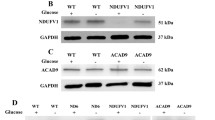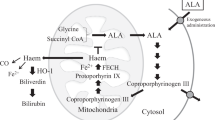Abstract
Mitochondrial trifunctional protein (MTP) deficiency caused by HADHA or HADHB gene mutations exhibits substantial molecular, biochemical, and clinical heterogeneity and ranks among the more severe fatty acid oxidation (FAO) disorders, without pharmacological treatment. Since bezafibrate has been shown to potentially correct other FAO disorders in patient cells, we analyzed its effects in 26 MTP-deficient patient fibroblasts representing 16 genotypes. Overall, the patient cell lines exhibited variable, complex, biochemical profiles and pharmacological responses. HADHA-deficient fibroblasts showed markedly reduced alpha subunit protein levels together with decreased beta-subunit abundance, exhibited a −86 to −96 % defect in LCHAD activity, and produced large amounts of C14 and C16 hydroxyacylcarnitines. In control fibroblasts, exposure to bezafibrate (400 μM for 48 h) increased the abundance of HADHA and HADHB mRNAs, immune-detectable alpha and beta subunit proteins, activities of LCHAD and LCKAT, and stimulated FAO capacities, clearly indicating that MTP is pharmacologically up-regulated by bezafibrate in human fibroblasts. In MTP-deficient patient fibroblasts, which were found markedly FAO-deficient, bezafibrate improved FAO capacities in six of 26 (23 %) cases, including three cell lines heterozygous for the common c1528G > C mutation. Altogether, our results strongly suggest that, due to variable effects of HADHA and HADHB mutations on MTP abundance and residual activity, improvement of MTP deficiency in response to bezafibrate was achieved in a subset of responsive genotypes.




Similar content being viewed by others
References
Aires V, Delmas D, Le Bachelier C et al (2014) Stilbenes and resveratrol metabolites improve mitochondrial fatty acid oxidation defects in human fibroblasts. Orphanet J Rare Dis 9:79
Aoyama T, Peters JM, Iritani N et al (1998) Altered constitutive expression of fatty acid-metabolizing enzymes in mice lacking the peroxisome proliferator-activated receptor alpha (PPARalpha). J Biol Chem 273:5678–5684
Boutron A, Acquaviva C, Vianey-Saban C et al (2011) Comprehensive cDNA study and quantitative analysis of mutant HADHA and HADHB transcripts in a French cohort of 52 patients with mitochondrial trifunctional protein deficiency. Mol Genet Metab 103:341–348
Choi JH, Yoon HR, Kim GH, Park SJ, Shin YL, Yoo HW (2007) Identification of novel mutations of the HADHA and HADHB genes in patients with mitochondrial trifunctional protein deficiency. Int J Mol Med 19:81–87
Das AM, Illsinger S, Lucke T et al (2006) Isolated mitochondrial long-chain ketoacyl-CoA thiolase deficiency resulting from mutations in the HADHB gene. Clin Chem 52:530–534
Djouadi F, Bastin J (2008) PPARs as therapeutic targets for correction of inborn mitochondrial fatty acid oxidation disorders. J Inherit Metab Dis 31:217–225
Djouadi F, Bonnefont JP, Thuillier L et al (2003) Correction of fatty acid oxidation in carnitine palmitoyl transferase 2-deficient cultured skin fibroblasts by bezafibrate. Pediatr Res 54:446–451
Djouadi F, Aubey F, Schlemmer D, Bastin J (2005a) Peroxisome proliferator activated receptor {delta} (PPAR{delta}) agonist but Not PPAR{alpha} corrects carnitine palmitoyl transferase 2 deficiency in human muscle cells. J Clin Endocrinol Metab 90:1791–1797
Djouadi F, Aubey F, Schlemmer D et al (2005b) Bezafibrate increases very-long-chain acyl-CoA dehydrogenase protein and mRNA expression in deficient fibroblasts and is a potential therapy for fatty acid oxidation disorders. Hum Mol Genet 14:2695–2703
Eaton S, Bursby T, Middleton B et al (2000) The mitochondrial trifunctional protein: centre of a beta-oxidation metabolon? Biochem Soc Trans 28:177–182
Fletcher AL, Pennesi ME, Harding CO, Weleber RG, Gillingham MB (2012) Observations regarding retinopathy in mitochondrial trifunctional protein deficiencies. Mol Genet Metab 106:18–24
Gillingham MB, Connor WE, Matern D et al (2003) Optimal dietary therapy of long-chain 3-hydroxyacyl-CoA dehydrogenase deficiency. Mol Genet Metab 79:114–123
Gobin-Limballe S, Djouadi F, Aubey F et al (2007) Genetic basis for correction of very-long-chain acyl-coenzyme A dehydrogenase deficiency by bezafibrate in patient fibroblasts: toward a genotype-based therapy. Am J Hum Genet 81:1133–1143
Haas M, Vlcek V, Balabanov P et al (2015) European medicines agency review of ataluren for the treatment of ambulant patients aged 5 years and older with Duchenne muscular dystrophy resulting from a nonsense mutation in the dystrophin gene. Neuromuscul Disord 25:5–13
IJlst L, Ruiter JP, Hoovers JM, Jakobs ME, Wanders RJ (1996) Common missense mutation G1528C in long-chain 3-hydroxyacyl-CoA dehydrogenase deficiency. Characterization and expression of the mutant protein, mutation analysis on genomic DNA and chromosomal localization of the mitochondrial trifunctional protein alpha subunit gene. J Clin Invest 98:1028–1033
Manning NJ, Olpin SE, Pollitt RJ, Webley J (1990) A comparison of [9,10-3H]palmitic and [9,10-3H]myristic acids for the detection of defects of fatty acid oxidation in intact cultured fibroblasts. J Inherit Metab Dis 13:58–68
Massie J, Castellani C, Grody WW (2014) Carrier screening for cystic fibrosis in the new era of medications that restore CFTR function. Lancet 383:923–925
Olpin SE (2013) Pathophysiology of fatty acid oxidation disorders and resultant phenotypic variability. J Inherit Metab Dis 36:645–658
Olpin SE, Clark S, Andresen BS et al (2005) Biochemical, clinical and molecular findings in LCHAD and general mitochondrial trifunctional protein deficiency. J Inherit Metab Dis 28:533–544
Orii KE, Orii KO, Souri M et al (1999) Genes for the human mitochondrial trifunctional protein alpha- and beta-subunits are divergently transcribed from a common promoter region. J Biol Chem 274:8077–8084
Perez B, Rodriguez-Pombo P, Ugarte M, Desviat LR (2012) Readthrough strategies for therapeutic suppression of nonsense mutations in inherited metabolic disease. Mol Syndromol 3:230–236
Purevsuren J, Fukao T, Hasegawa Y, Fukuda S, Kobayashi H, Yamaguchi S (2008) Study of deep intronic sequence exonization in a Japanese neonate with a mitochondrial trifunctional protein deficiency. Mol Genet Metab 95:46–51
Sperk A, Mueller M, Spiekerkoetter U (2010) Outcome in six patients with mitochondrial trifunctional protein disorders identified by newborn screening. Mol Genet Metab 101:205–207
Spiekerkoetter U, Khuchua Z, Yue Z, Bennett MJ, Strauss AW (2004) General mitochondrial trifunctional protein (TFP) deficiency as a result of either alpha- or beta-subunit mutations exhibits similar phenotypes because mutations in either subunit alter TFP complex expression and subunit turnover. Pediatr Res 55:190–196
Sykut-Cegielska J, Gradowska W, Piekutowska-Abramczuk D et al (2011) Urgent metabolic service improves survival in long-chain 3-hydroxyacyl-CoA dehydrogenase (LCHAD) deficiency detected by symptomatic identification and pilot newborn screening. J Inherit Metab Dis 34:185–195
Wanders RJ, Ruiter JP, IJLst L, Waterham HR, Houten SM (2010) The enzymology of mitochondrial fatty acid beta-oxidation and its application to follow-up analysis of positive neonatal screening results. J Inherit Metab Dis 33:479–494
Acknowledgments
This study was supported by grants of the Association Française contre les Myopathies (AFM).
Compliance with ethics guidelines
All procedures followed were in accordance with the ethical standards of the responsible committee on human experimentation (institutional and national) and with the Helsinki declaration of 1975, as revised in 2000. Informed consent was obtained from all patients for being included in the study.
Conflict of interest
None.
Author information
Authors and Affiliations
Corresponding author
Additional information
Communicated by: Jörn Oliver Sass
Rights and permissions
About this article
Cite this article
Djouadi, F., Habarou, F., Le Bachelier, C. et al. Mitochondrial trifunctional protein deficiency in human cultured fibroblasts: effects of bezafibrate. J Inherit Metab Dis 39, 47–58 (2016). https://doi.org/10.1007/s10545-015-9871-3
Received:
Accepted:
Published:
Issue Date:
DOI: https://doi.org/10.1007/s10545-015-9871-3




